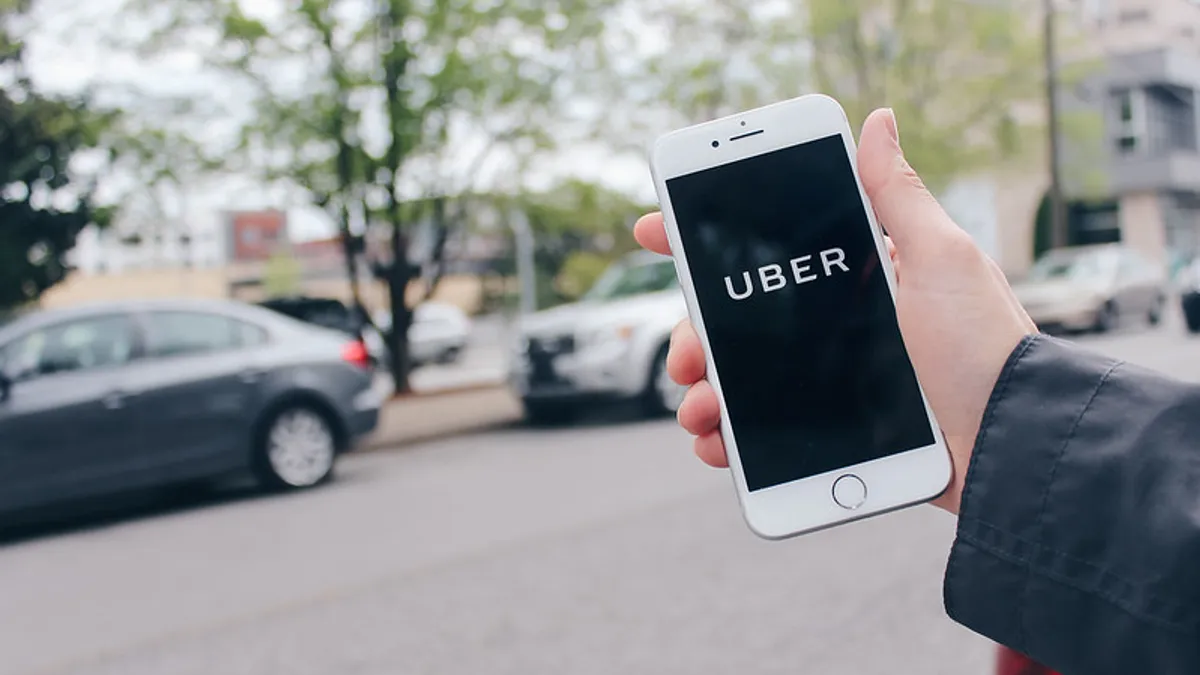Dive Brief:
- Uber has launched a suite of rideshare products designed to help employers plan commutes and other transportation needs as they reopen during the COVID-19 pandemic, the company told HR Dive.
- Two products will be piloted by Uber for Business, the company's enterprise business arm: Employee Group Rides, which will match employees from the same company to commute together during days and times specified by their employer, and Business Charter, which will allow companies to reserve an "exclusive fleet of vehicles."
- Both solutions will launch in North America, Europe and the Asia-Pacific region, Uber said. Organizations including restaurant chain Eataly have previously used Uber for Business to provide customized commute programs for their essential workers, it added.
Dive Insight:
The initiative builds off Uber for Business' existing enterprise partnerships as well as its other pandemic-related initiatives. The company, for example, also provides "free transportation to frontline healthcare workers" via its Uber Health division and free meals to first responders and healthcare workers in the U.S. and Canada through Uber Eats, per its website.
"Since the onset of COVID-19, interest in Uber for Business' commute programs has nearly doubled," the company said. "Rideshare solutions that are tailored to company and employee needs, as well as local social distancing guidelines, will play a significant role in how businesses reimagine their commuting experience."
Uber's main competitor, Lyft, announced a similar product launch in July in the form of Lyft Pass. The product allows businesses to create custom transportation arrangements and pay for workers' Lyft rides. In April, Lyft said it would provide free ride credit to essential workers through partner organizations, including the U.S. Hispanic Chamber of Commerce, the NAACP and the Black Women’s Roundtable.
While such offerings may allow employers to enhance the physical safety of employees, employers might also need to address the pandemic's mental health toll, sources previously told HR Dive. Those operating in front-line or essential roles during the pandemic face increased risk of COVID-19 exposure, according to the Occupational Health and Safety Administration. The need for mental health care to combat essential workers' resulting anxiety, depression and other conditions may outlast the pandemic itself, CNBC reported in April.
Some employers operating in essential industries have taken steps to provide enhanced mental healthcare access during the pandemic. Target, for example, "is offering all U.S.-based team members free access to additional online resources that support their mental, emotional and physical health," including access to web-based and mobile app resources, per its website. In a press release, on-demand delivery service Postmates announced a "new fleet resource portal" that includes some access to primary and mental health services.
Employers may also need to invest in training that allows essential workers to navigate stressful situations with customers. Mask policies have proven a potential flash point, with reports of beratement, assault and even killing of workers who attempt to enforce masking rules. Employers can address such conflict by educating employees on de-escalation methods, but if customers are still non-compliant, managerial staff may need to call security or police in more serious situations, one employment attorney previously told HR Dive.












